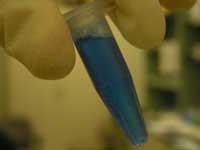Standard not always valid

This was the case of a researcher at the Alberta University of Canada who sought a way to prevent Parkinson's disease. Specifically, the influence of certain drugs on the activity of a protein related to this disease was being studied. He knew that the drugs in his hands stopped the activity of this protein, but in his experiment the effect was excessive. It had much less drug than in other experiments to slow down protein activity.
Surprised, the researcher began to analyze what was behind. In that context, he discovered that if this same experiment was done in glass containers he did not get that strange result. He therefore concluded that the plastic tubes used were responsible for this change.
He kept pulling this thread and carried out different tests with plastic tubes. Some filled them with water, others with alcohol, and after a while observed that a disinfectant compound was released from the plastic that greatly interrupted the activity of its protein. That is, the plastic released the compound and the medicine he was testing had the same effect.

When an unexpected component becomes a participant in its own experiment, the results obtained do not serve to draw useful conclusions from that experiment. The researcher at Alberta University could not use the results obtained in this experiment for the objective that was proposed. But it wasn't useless work either. With his conclusions he wrote an article, managed to publish it in the prestigious scientific journal Science and managed to draw the attention of the rest of scientists. It is not little!
Plastic problems
If they had to look for a representative of plastic appliances, scientists should go to the glass. There are eleven devices used by laboratories. But not all appliances can be made of glass, for one main reason: they are very fragile. Therefore, for scientists it is essential that some of the devices be made of plastic. They are used worldwide, almost in all laboratories.
For the manufacture of plastic tooling, manufacturers must add a number of compounds that guarantee hardness, durability, stability, etc. Some of these compounds are able to influence living beings in some way. However, manufacturers did not believe that these compounds would be able to shed plastic and become part of the experiment.

But Alberta's scientist has shown that it is so. And how to solve this side effect of plastic products? There seems to be a way to do this: clean plastic utensils well before performing any experiment, both with alcohol and pure water.
This prevents plastic components from becoming part of the subsequent experiment. However, sometimes scientists need twice as long as they would need to perform the experiment. Nobody said being a scientist is easy!
Published in 7K.
Buletina
Bidali zure helbide elektronikoa eta jaso asteroko buletina zure sarrera-ontzian











